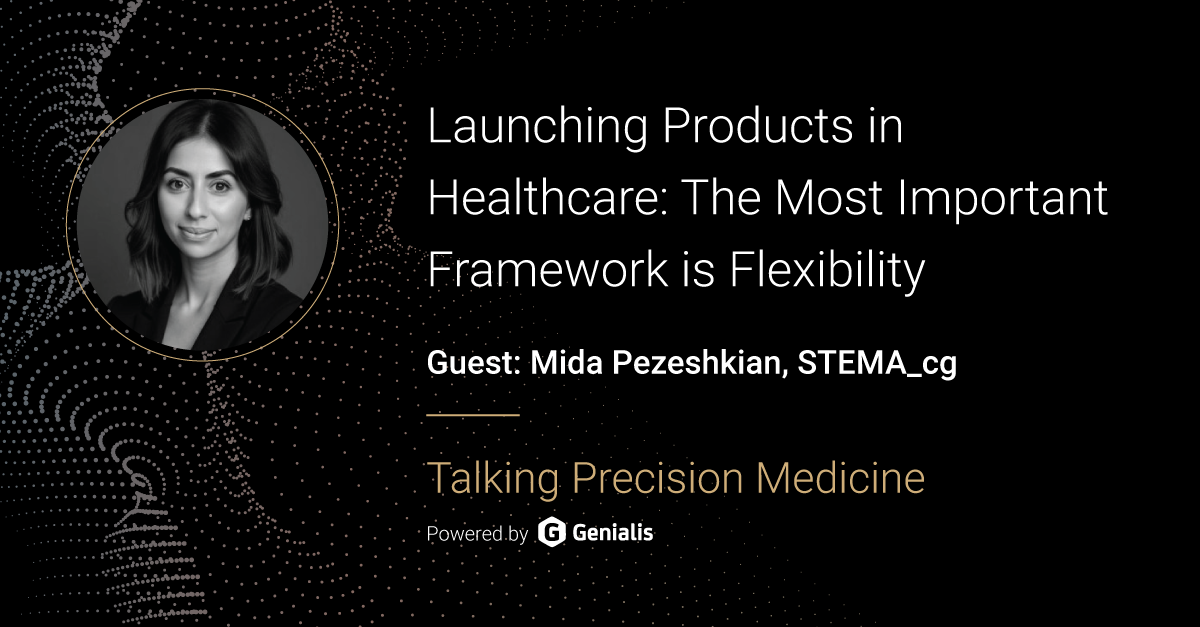Welcome to Talking Precision Medicine (TPM podcast) — the podcast in which we discuss the future of healthcare and health technology, and how advances in data and data science are fueling the next industrial revolution.
Joining us on this episode is Mida Pezeshkian, an old colleague and friend. Mida’s career has spanned from the depths of stem cell science as a student to her current focus on product management in healthcare. We talk about what it really takes to launch products in this space, and how she helps customers bring truly transformational innovations to market.
Come on in and have a listen.
Episode highlights:
From STEM to STEMA_cg
- Dr. Mida Pezeshkian is the founder and principal at STEMA_cg, a boutique consulting firm helping biotech, healthcare companies, and investors commercialize products, scale operations, and make informed investment decisions.
- Her path began in math and chemistry before moving into biology, interdisciplinary research, and product management.
- Mida also shares thoughts on commercialization strategy, product management frameworks, and market intelligence through her blog The Lab.
A flexible model for different stages
- For early-stage companies, Mida often acts as a fractional chief product officer, building commercialization plans and executing launch activities.
- For scale-ups and enterprise pharma, she works on strategic growth initiatives, identifying new markets, product lines, or digital health partnerships.
- Across all engagements, she applies a problem-solving, product management mindset: connecting cross-functional teams, aligning on outcomes, and using data to guide decisions.
Defining unmet needs, not just building features
“What I sometimes observe when I go into these scenarios is that thinking about the non-customer – the not‑now customer – is very important also. So don’t get too caught up with just the customer base, because that’s where a lot of technology companies over the years have gotten obsolete – because they’ve catered to a certain population of customers and then forgotten where the market is moving. So keeping in touch with where the market is moving is super important.”
- Observing workflows first-hand helps identify pain points and inefficiencies.
- Success requires fitting solutions into the full customer workflow (upstream and downstream), so adoption is seamless.
Data-driven decision-making
“I think the change that those who do it right will see is a complete reimagination of how we used to design products. So instead of, like we said earlier, not just trying to automate things, but actually trying to redesign them with the technology that’s accessible to us through AI and machine learning now. I think those who probably won’t succeed as much are the folks that either don’t adopt AI in their work or just apply it in a limited, automation-focused way. So that’s the gap. But I think completely shifting our mindset of how we design products with the tools that are available to us now is going to be the winning recipe.”
- Data pipelines and advanced analytics (including AI/ML) are central to Mida’s approach, whether for market analysis, pricing strategy, or product optimization.
- She advises thinking like an AI-native company from the ground up, redesigning workflows for new technology rather than simply automating old ones.
- In 10 years, she expects the leaders in biotech to be those who fully reimagine product design with AI and machine learning: not just as add-ons, but as foundational to solving problems in new ways.
This has been Talking Precision Medicine. Please subscribe and share our podcast with your colleagues, leave a comment or review, and stay tuned for the next episode. Until then you can explore our TPM podcast archive and listen to interesting guests from our past conversations.




